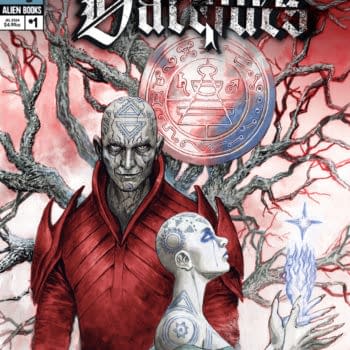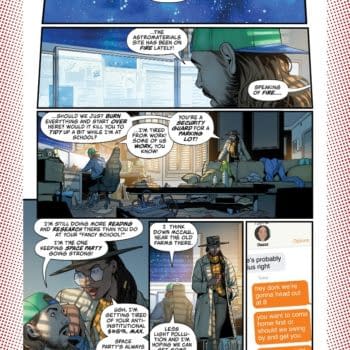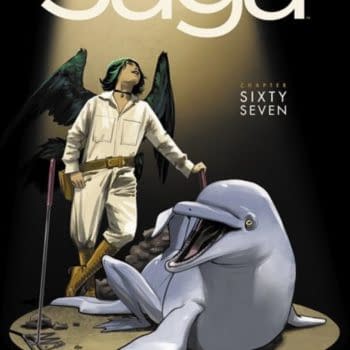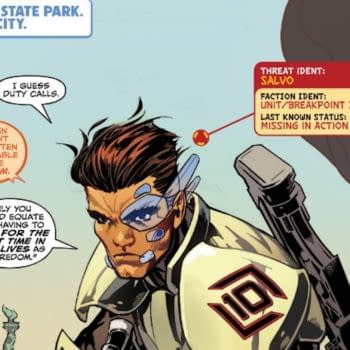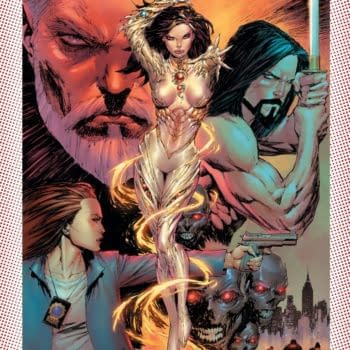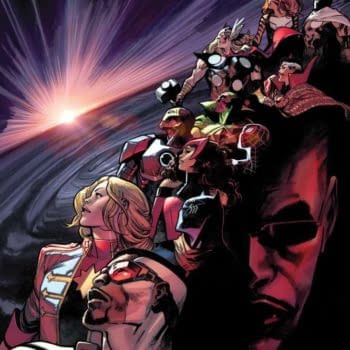Posted in: Comics | Tagged: Comics, entertainment
The Challenge Of Violence And More – Image Comics Presented Contemporary Storytelling At C2E2

Friday afternoon at C2E2 saw an Image Comics panel on contemporary storytelling. The panel description stated that creator-owned comics allow creators to touch on contemporary issues and that the best stories tell us something about ourselves and the times we live in.
Panel host David Brothers led off by asking the assembled group to quickly describe their books. Paul Azaceta described Outcast as 'Exorcist Meets Invasion of the Body Snatchers'. Kieron Gillen jokingly described The Wicked + The Divine as 'The thing that would most improve your life' before saying that the book is about the moment when you quit being a fan and start being a creator. Daniel Warren Johnson said that Extremity is about replacing the spirit of an artist with the spirit of vengeance. Jonathan Hickman was late to the panel and while he didn't directly answer the question, he did say that The Black Monday Murders was one of those ideas that just jumps into your head fully formed.
This prompted an audience member to shout out 'Move the microphone closer to your mouth so we can hear you' to which Hickman responded 'you don't have a microphone so I couldn't hear what you just said.' After a brief pause for laughter, Brothers asked Azaceta and Johnson if they felt their books, both of which occasionally veer into extremely violent territory, if they were ever worried that their books went too far in terms of violence for their audiences.
Johnson said this was a question he was constantly asking himself and that he didn't really have an answer to it. Azaceta stated that he didn't think there was any such thing as going too far because the decision was ultimately up to the reader. If the reader feels that a book goes too far in any way, the reader will quit buying it.
When Brothers asked Hickman why he had made banks the villain in The Black Monday Murders, he prefaced his response by saying he was at a point where stories about people vs. other people no longer interested him. He added that he had written lots of stories about people vs. other people over the years and assumed he would write more in the future, but that what interested him right now were stories about people vs. nature, and that in the modern world nature is less the outdoor world and more the complex systems, such as the financial system, that surround our entire lives.
Hickman was also asked about the additional material he provides in his work, citing the newspaper articles, graphs, and other things he included in Black Monday Murders. He replied by saying that if you present information like that as fact, readers will process it that way whether it is or not and include it when thinking about the material. Johnson noted it was similar to the Coen Brothers saying at the start of Fargo that it was a true story when it point of fact it wasn't.
Johnson was asked why the driving impetus for his main character Thea to seek revenge was having her drawing hand chopped off. He said he had considered all the various tropes used over the years to set a character off on a revenge quest, and that while something like the loss of a parent was a compelling reason to seek vengeance, he both wanted something that felt more personal to him and that hadn't been done before. Johnson said that as an artist the idea of losing his drawing hand was a nightmare scenario for him.
Gillen was asked if writing for him was an exorcism, to which he replied 'yes, it's an unholy endeavor'. As a serious response, he said he felt writing The Wicked + The Divine was a matter of interrogating himself, not just on music but on all of popular culture. He said the book was intentionally becoming more difficult for the reader, adding that in many ways he saw it as a four-year educational course.
Brothers then asked Azaceta and Johnson about the importance of family in their books. Johnson said he had been home-schooled all through high school, and that for him, personally, family was one of the most important aspects of his life. Azaceta said he felt that family gave readers a way to find themselves in the book and thus find it more relatable to them.
By then it was time for audience questions, and the first went to Hickman, who was asked about the way he has personified Death in East of West. The audience questioner wanted to know why Hickman had taken an approach to Death so different than what other writers had taken in the past, to which Hickman replied that if you're just going to do what other creators have done before you and you don't see a way to improve on what they've done, why bother – do your own thing with the character.
The panel was then asked if the writers ever found their personal opinions on a subject changing due to writing that subject. Gillen said that no, his opinions haven't changed but that occasionally a character will adjust somewhat over the course of writing. Hickman pointed out that Gillen was a great example of the writer as God, that is the writer creating a universe down to the smallest character details and then putting the characters into that universe. Hickman added with a smile that he has been known to do the same thing as well.
Gillen was asked if he had ever considered what it would be like to put the characters from Phonogram into the situations of the gods in The Wicked + The Divine. The questioner added that The Wicked + The Divine characters seemed to be curdling into the worst versions of themselves while the Phonogram characters had found themselves going through personal growth by the end of the story. After telling the questioner that he really liked that description of the characters in The Wicked + The Divine, he had from the start considered those characters limited by the time frame of the overall story.
The panel drew to a close with a last question for the whole panel, asking them how they were able to get to the point where they could put their characters through such harsh circumstances. Hickman jokingly said that when a character becomes more popular with readers than Hickman himself is, it becomes time for that character to suffer. He then pointed out a sequence in the movie Adaptation where a character asks writing consultant Robert McKee why a writer can't create a story like the real world where nothing much happens. McKee's response was that stories without conflict are boring and that death, love, hate, illness, war, corruption are all parts of the real world. Gillen added that if you as a writer care about your characters, you find yourself wanting them to overcome something, and the only way that happens is if you create something for them to overcome.






